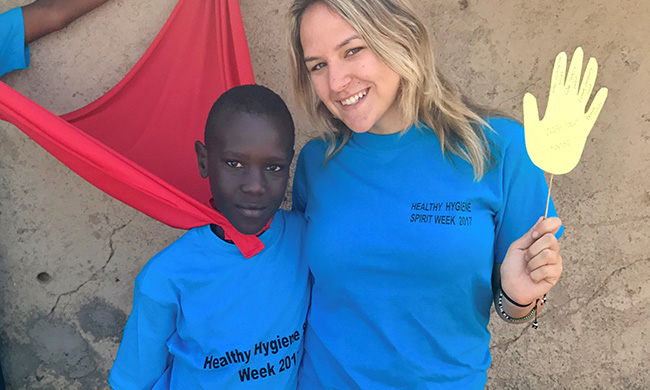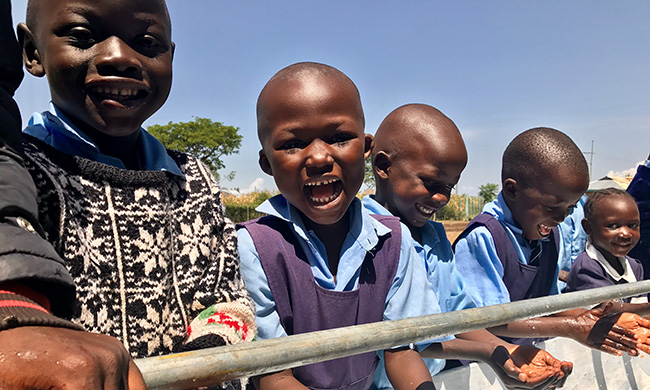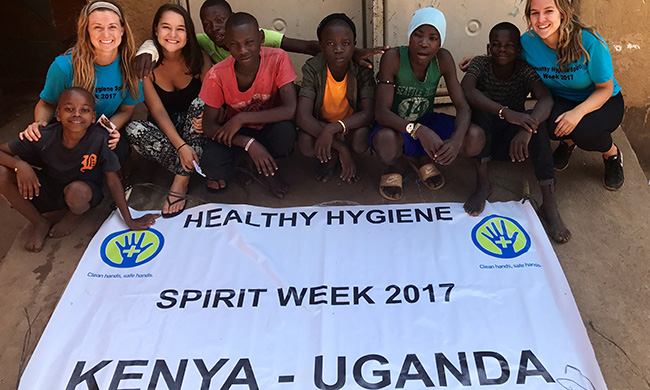Student promotes hand hygiene through public health strategies
College of Health and Behavioral StudiesBy: Caroline Whitlow
Creative Services Student Writer

Health sciences major Stephanie Pasewaldt completed her Honors College capstone project at schools in Uganda and Kenya, where she promoted handwashing through education and infrastructure interventions.
“The goal of my capstone, ‘Healthy Hygiene Spirit Week,’ was to promote healthy handwashing habits among students at primary schools in Uganda and Kenya. I developed, implemented and evaluated the program, which consisted of a six-day hand hygiene curriculum and construction of a handwashing station at each school.”
Pasewaldt, who took interest in global health through volunteer experiences in high school, had previously worked in East Africa and felt drawn back to the region. She collaborated with the founder of Raising Up Hope for Uganda Primary School and Orphanage, Patrick Ssenyonjo, as well as the founder of a Kenyan youth empowerment agency, Nick Oketch, who connected her to Owimbi Academy.
“I knew I wanted to continue working in this region. I developed strong relationships with Patrick from Raising Up Hope and Nick from Owimbi Academy, and interned with them before beginning my project,” said Pasewaldt. “Through my work in Uganda and Kenya, I became exposed to the many challenges their schools faced and became dedicated to helping them. My choice to implement my project at Raising Up Hope for Uganda and Owimbi Academy was driven my passion for empowering their children and communities.”
Before selecting an issue to target, Pasewaldt interned at each school during the summer of 2016. At Owimbi Academy, she taught English and public speaking classes. School staff at Raising Up Hope assigned her to various responsibilities including attending social work meetings, organizing a soccer tournament, participating in food security outreach and leading self-esteem activities. While performing the duties of her internship, Pasewaldt conducted comprehensive needs assessments in order to choose a target topic for her capstone.
“When I began developing my project, I did not know what specific health behavior to target. My goal was to address an important health issue at the school,” said Pasewaldt. “Through the needs assessment, I identified a lack of hygiene knowledge and an absence of handwashing facilities.”
When developing curriculum, Pasewaldt focused on how to make the project sustainable. She worked with teachers to create a monitoring system for the handwashing station and also formed a “Scrub Club” of “handwashing heroes” to hold their peers accountable.

“I focused on providing teachers and students with resources and ideas to continue promoting handwashing and hygiene. Future students may not experience the exact program I implemented, but I hope healthy behaviors transfer from current students to future generations,” said Pasewaldt.
Throughout the program, Pasewaldt developed close relationships with students who say she inspired them. Some stay in contact with her and provide updates about their hygiene experiences.
“The most rewarding moment of the project so far was receiving a phone call from one of my students, Maxwell. I was sitting on my couch and all of a sudden I had a phone call from an unidentified number in Kenya,” said Pasewaldt. “I answered and hear ‘Aunt Steph? It’s me, Maxwell!’ He called to tell me that he had built handwashing stations for two of his neighbors using water jugs and old pipes. He explained to me that it ‘wasn’t even hard’ and his neighbors ‘wash their hands every day now.’ I seriously started crying. Hearing about Maxwell’s efforts confirmed I had inspired at least one student, which is all I could have asked for.”
Pasewaldt’s interactions with students like Maxwell have shifted the health sciences major’s strategy for tackling global problems. She now focuses not on the scale of her engagement projects, but each project’s impact.
“I realized that starting small was important and then you can build upon what you start to create big changes,” said Pasewaldt. “When I first began, I wanted to tackle all the problems at once. I had so many ideas, but through the development process, I realized all my goals were not feasible at a given time. By focusing primarily on handwashing, I was able to create a more impactful, comprehensive program rather than one that addressed 10 different issues, but in an ineffective manner.”
In March, Pasewaldt will return to Raising Up Hope for Uganda, where she will continue to work on improving sanitation through a JMU Student Engagement Mini-Grant awarded by the Faculty Senate and Student Government Association. It will mark her fifth journey to East Africa.

“’Healthy Hygiene Spirit Week’ was a step in the right direction, however there are still many issues that need to be addressed. I remain dedicated to this project and will use the grant money to construct two new toilets for the school and follow up on the handwashing station’s impact.”
Watch our #CHBSChats with Stephanie to hear more about how JMU has prepared her for her future...https://www.jmu.edu/news/chbs/2018/03-22_CHBSChats_pasewaldt.shtml
To follow Pasewaldt’s work abroad, follow her global engagement Twitter account.

